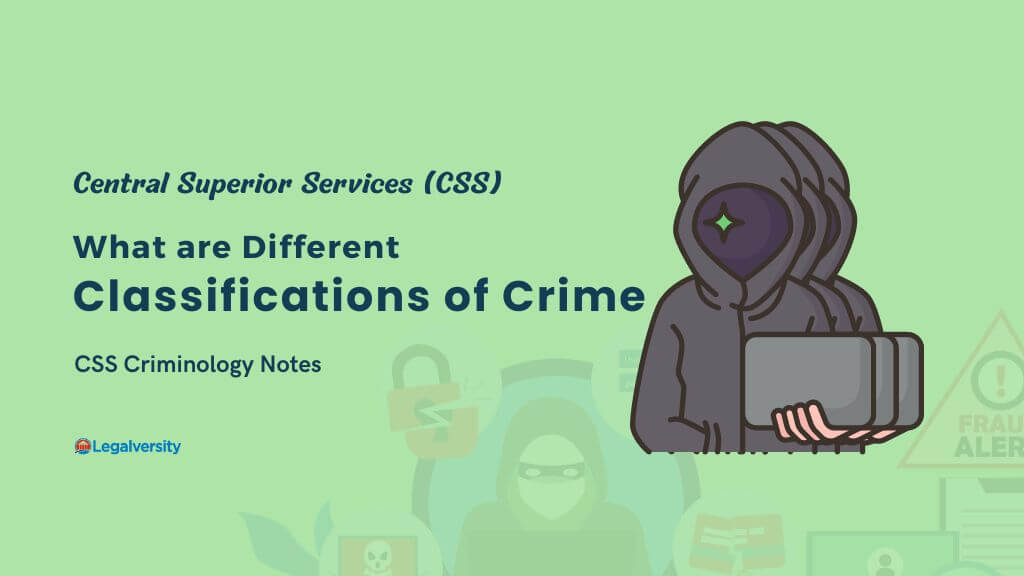In simple words, “A Criminal is a person who has committed a crime. There are three classifications of criminals”. Here you will learn about the different classifications of crime.
There are mainly three classifications of Crime:
- Habitual Criminals
- Occasional Criminals
- Professional Criminals
1. Habitual Criminals
A habitual criminal is a person who has been convicted of a crime several times. The term “habitual offender” may imply that the person has been convicted of the same crime many times, but it may also refer to a person who has many convictions for different crimes on their record.
A habitual offender is a person who frequently has been convicted of criminal behavior and is presumed to be a danger to society.
The nature, scope, and type of habitual offender statutes vary, but generally, they apply when a person has been convicted twice for various crimes.
Usually, the sentence is greatly enhanced, in some circumstances, it may be substantially more than the maximum sentence for the crime.
The idea of habitual-offender legislation reflects the basic assumption of positivist
criminology that crime is similar to disease and should be treated by comparably flexible measures.
Section 75 of the Pakistan Penal Code deals with Habitual Offenders. The provisions
are activated upon a second conviction for a crime with a minimum sentence of three years imprisonment.
Examples of Habitual offenses:
- DUI (driving under the influence of intoxicants)
- Driving with a suspended or revoked license
- Reckless driving; or
- Homicide (including murder, manslaughter, negligent homicide, or vehicular homicide)
2. The Occasional Criminal
Occasional criminals are not persons belonging to a criminal career. It means they are not professional but they commit crimes due to drift in the middle between conventional and criminal behavior. They only perform the act if the opportunity occurs in his/her routine of daily life.
The occasional criminal only performs the act if the opportunity occurs in his/her routine of daily life.
For example, someone is walking by a car & it happens to be unlocked & the person notices they might take their car stereo, etc.
Examples of Occasional Criminals:
- Most crimes are committed by amateurs whose acts are unskilled, and unplanned
- Occasional crime occurs when there is a situational inducement
- The frequency of occasional crime varies according to age, class, race, and gender
- Occasional criminals have little group support for the crimes
There is a class of occasional criminals, who do not exhibit, or who exhibit in slighter
degrees, the anatomical, physiological, and psychological characteristics.
There are occasional criminals who commit the offenses characteristic of habitual
criminality, such as homicides, robberies, rapes, etc.
There is no doubt that, even with the occasional criminal, some of the causes which
lead him into crime belonging to the anthropological class; for external causes would not suffice without individual predispositions. Millions of property and theft-related crimes are done by occasional criminals.
3. Professional Criminal
A professional Criminal is a person who pursues crime as a day-to-day occupation,
developing skilled techniques and enjoying a certain degree of status among other
criminals.
It proposed the existence of a population of habitual offenders whose approach to offending included a degree of organization, repeated offending, and specialism in certain forms of offending.
Examples of Professional Criminals:
Scholars like Sutherland and Caldwell has given following examples of professional criminals:
- Regularity: continuity in work as crime.
- Technical skill: use of complex techniques for committing a crime that has been used in crime over a long period of time.
- Status: enjoying a position of high prestige in the world of crime.
- Consensus: sharing of common values, beliefs, and attitudes with other criminals.
- Organization: pursuing activities through an informal information and assistance
system. - Differential association: association with other professional criminals to the
exclusion of ordinary criminals as well as law-abiding persons - Crime is his main source of livelihood: He devotes his full working time and energy to it and constantly attempts to improve his skills. He tries to specialize in one or two crimes. He normally obeys the law, except when it interferes with his crime.
- Crime is his way of life: The professional criminal develops a philosophy of his own and organizes his life and activities around new values, attitudes, and beliefs.
- He operates with proficiency and carefully plans his activities: He takes calculated risks and dislikes those who bungle and fail.
- He is a product of a process of development: He acquires his specialized knowledge, attitudes, and skills gradually. Usually, he acquires skills under the instruction and guidance of somebody who has already achieved proficiency and status in his criminal specialty. However, no formal process of recruitment and training is involved in the development.
- He identifies himself with the world of crime and criminals.
See these as well:

